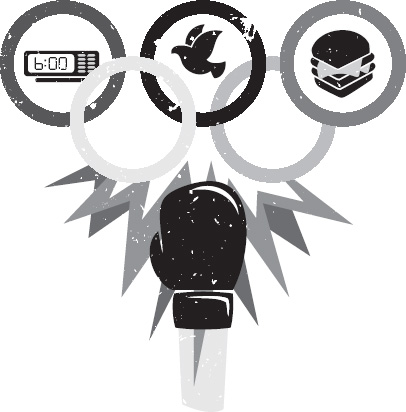Read Uncle John’s Bathroom Reader Zipper Accidents Online
Authors: Uncle John’s
Uncle John’s Bathroom Reader Zipper Accidents (38 page)

Athletes:
Eddie Hart and Rey Robinson
Event:
100-meter dash
Story:
At the 1972 Summer Olympics, Americans Hart and Robinson were the favorites to win gold and silver in the 100-meter dash. On the morning of August 31, they both made it handily through their heats, and qualified for the quarterfinals, to be held that evening. While Hart, Robinson, and their coach, Stan Wright, were on a stroll that afternoon, they saw races being shown on a television screen in the Olympic Village. At first they thought it was a replay of their morning races, but then they saw a race about to start with Hart’s name listed for it…with an “N/A” next to it. The quarterfinals were being held
now.
The three ran (really fast, we imagine) to the stadium, but they were too late. Hart and Robinson missed their races and were immediately disqualified. Wright was blamed for the fiasco at first, but the U.S. Olympic Committee later admitted that Wright had been given a race schedule that was later changed, and he had not been notified. Hart and Robinson went home empty-handed and never made it to the Olympics again.
Athletes:
Olympic torchbearers
Event:
Lighting the Olympic flame
Story:
During the opening ceremonies at the 1988 Summer Olympics in Seoul, South Korea, hundreds of live “Doves of Peace” were released into the packed Olympic stadium, an Olympic tradition going back to 1920. The doves are supposed to be released just as the Olympic flame is being lit, but, for reasons unknown, this time they were released
several minutes beforehand. Where did the doves go? Dozens landed on the soon-to-be-lit Olympic cauldron. Minutes later, as the huge crowd looked on, the three Olympic torchbearers—who could plainly see all the birds on the cauldron—lit the flame. And a bunch of Doves of Peace became barbecued Doves of Peace. Furious protests by animal-rights groups followed, apologies were issued, and releasing live doves during opening ceremonies lasted just one more Olympics before the practice ended.
Athlete:
Lindsey Jacobellis
Event:
Snowboard cross
Story:
At the 2006 Winter Olympics, American snowboarder Jacobellis was almost 50 yards ahead of her nearest competitor with about 100 yards to go in the women’s snowboard cross final. On the second-to-last jump, Jacobellis made an early-celebration showboating move—and fell straight on her rear end when she landed. She scrambled to her feet and tried to make it to the finish line in first place, but the snowboarder who had been so far behind her, Switzerland’s Tanja Frieden, swooped by—and won the race by a comfortable three-second margin. In postrace interviews, Jacobellis said she hadn’t been show-boating—she’d only been trying to stabilize herself in the air. She later admitted that she
had
been showboating.
Athletes:
North Korean women’s soccer team
Event:
Before a match
Story:
In the minutes before the 2012 Summer
Olympics match between the North Korean and Colombian women’s soccer teams, the North Korean players looked up to see their faces and names on the jumbo screens around the stadium. Alongside the team photos was an image of a flag—the flag of South Korea. Outraged North Korean players stormed off the field and refused to play. Panicked officials could be seen on the sidelines trying to calm players and coaches as the video crew worked to get the right flag on the screens. Finally—after 40 minutes—they did, and the game began. London’s Olympic Committee was forced to issue formal apologies—even British Prime Minister David Cameron apologized for the gaffe. An Olympic Committee spokesman later said the error had been made by a London video producer (whom they declined to name).


T
HE CASH COW
Back in the late 1960s, pro football wasn’t the overwhelmingly popular sport it is today. In those days, it enjoyed mostly regional popularity in the upper Midwest and Northeast. But the two leagues, the AFL and NFL, merged in 1966, consolidating resources just as the sport was becoming far more popular. NFL commissioner Pete Rozelle knew that a weekly TV game would increase exposure and take the sport national—and Major League Baseball already televised games nationally. Rozelle approached CBS and NBC, the #1 and #2 networks. Because of that, they weren’t looking to give up three hours of prime-time programming each week for a sport that wouldn’t draw as many viewers as shows like
Laugh-In
or
My Three Sons
.
There were only three networks then, so Rozelle went to third-place ABC…which had nothing to lose. They agreed to air a weekly NFL game on Monday nights, and in fall 1970,
Monday Night Football
debuted. Not only did it help popularize pro football in the United States, it made billions for ABC and was a Top-20 show for most of its run. It moved to ESPN in 2006.
THE CLASSIC
In the early ’80s, the hottest thing going on broadcast TV were soaps like
Dynasty
and
Dallas
, and action shows like The
A-Team
and
Simon & Simon
. What wasn’t popular? Situation comedies. In the 1982–83 season, there was only one comedy in the Nielsen Top 10:
Three’s Company
, on ABC. The unpopularity of sitcoms was one of the reasons why ABC entertainment president Lewis Erlicht personally rejected a pitch from enduringly popular comedian Bill Cosby for a comedy about an upper-middle-class African American family. Another reason was that Cosby wanted a full commitment from the network—he wanted a guarantee the show would air without his having to submit a script or produce a pilot episode. In his assessment, Erlicht wrote that the show “lacked bite,” and that “viewers wouldn’t watch an unrealistic portrayal of blacks as wealthy, well educated professionals.” He was quite wrong.
The Cosby Show
debuted on third-place NBC in fall 1984. That season it was the #3 show on TV…and for the next five seasons it was the #1 show on TV, launching NBC into first place.
“WHAT SHOW WAS REJECTED BY ABC, CBS, NBC, UPN, AND MTV?”
THE JUGGERNAUT
What show was rejected by ABC, CBS, NBC, UPN, and MTV, only to be accepted by Fox as a low-key summer replacement?
American Idol
, the #1 show on TV for seven straight years, and which generates nearly $1 billion in revenue a year for Fox.
I
n the 1450s, the gunsmith Urban of Hungary crafted “the Basilica,” the largest cannon ever built. The 19-ton behemoth required 100 men to move and could shoot an 800-pound cannonball over a mile. Urban tried to sell the Basilica to Byzantine emperor Constantine XI, but Constantine turned him down on grounds that the cannon was too expensive. So Urban sold it to Ottoman Turk leader Sultan Mehmed II, who used the cannon to blow down the walls of Constantinople in 1453 and take the city from Constantine XI.
•
Hitler left the defense of France’s Channel Coast to one of his top commanders, Erwin Rommel. On the night of June 5, 1944, things were so quiet and safe, Rommel decided to head home to Germany and surprise his wife for her birthday.
The next day was D-Day.
•
John Sedgwick, a major general for the Union during the Civil War, found the Confederate sniper attacks at the Battle of Spotsylvania to be wanting. “What! What! Men dodging this way from a single bullet! I am ashamed of you. They couldn’t hit an elephant at this dist—” were reportedly Sedgwick’s last words.


I
n 1896 publisher Alfred Harmsworth
founded the
London Daily Mail
, which is still in print today. He held reporters to a very high standard, but liked to check in with them to see if they enjoyed their work. He once asked his staff if they were happy working for him. One reporter, attempting to tell Harmsworth what he thought he wanted to hear, said, “Yes, sir.” Harmsworth immediately fired him, telling the reporter, “I don’t want anyone here to be content on five pounds a week.”


In April 2012, Khristopher Brooks
was offered what he called a “dream job”: a position as a reporter for the
Wilmington News Journal
in Delaware. He was so happy he wrote a story about the hire—written as though it were a
News Journal
press release—and put it on his blog. A week later, the editor of the paper called Brooks. He’d seen the “press release,” he said, and Brooks was guilty of “illegal use of the company logo” in it, as well as the improper quoting of a section of the letter offering him the job. Result: The job offer was rescinded.
